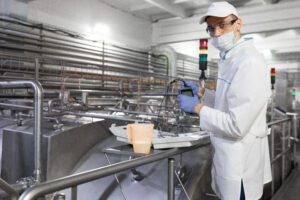Contents
Show
Book LOLER Thorough Examination
Need your lifting equipment examined in line with LOLER98 regulations? Get a quote today to ensure you remain compliant.

Need your lifting equipment examined in line with LOLER98 regulations? Get a quote today to ensure you remain compliant.
Stay compliant. Stay safe. Book your examination today with SEIS – your trusted independent inspection & testing company in Louth.
Thorough examinations in line with LOLER98 are legally required, periodic examinations, for all lifting equipment. The aim of these examinations is to ensure equipment and workplace safety, and overall compliance in line with UK regulations. In turn protecting your workforce from potential hazards, and you from non compliance.
Book LOLER Inspection
History of Louth
Louth is a historic market town situated at the edge of the Lincolnshire Wolds, known for its picturesque streets, Georgian architecture, and long-standing role as a regional centre for agriculture and trade. The town’s origins date back to at least Saxon times, with evidence of earlier Roman activity in the area. Its name likely comes from the River Lud, which runs through the town and contributed to its development as a settlement.
By the medieval period, Louth had become an important ecclesiastical and market town. Its most prominent landmark, St James’ Church, boasts the tallest spire of any parish church in England and was completed in the 15th century. The church and town played a role in the Lincolnshire Rising of 1536, a rebellion against the dissolution of the monasteries under Henry VIII. Louth’s historical prosperity came from its agricultural surroundings, textile trade, and its position as a hub for rural commerce.
Industry in Louth and the Surrounding Area
Louth has long been associated with agriculture and food production, serving as a key market and service centre for the surrounding farming communities of eastern Lincolnshire. The region’s fertile soils support the production of crops such as wheat, barley, sugar beet, and vegetables, while livestock farming—particularly cattle and sheep—also plays an important role. Louth hosts regular livestock markets and has long-standing ties to agricultural support services, including machinery sales, feed supply, and veterinary care.
In the modern era, the town has developed a solid base in the food processing and manufacturing sectors. Local companies are involved in the production of meat products, dairy, frozen foods, and baked goods, many of which are distributed nationally. Notably, Louth is home to several well-regarded independent food producers, contributing to its reputation as the “food capital of the Wolds.” Artisan bakeries, butchers, and delicatessens thrive in the town centre, supporting a growing agri-food tourism sector.

Beyond agriculture, Louth also hosts a variety of small- to medium-sized enterprises on its industrial estates, including light manufacturing, engineering, logistics, and construction-related businesses. The town’s strategic location near the A16 and proximity to Grimsby, Immingham, and Lincoln makes it a viable location for regional trade and commuting. Tourism and hospitality are also growing industries, boosted by Louth’s heritage, scenic surroundings, and events such as the annual Louth Run for Life and local food festivals.
Overall, Louth maintains a balanced and resilient economy rooted in its agricultural past, but supported by modern manufacturing, food production, and rural enterprise.
Louth is surrounded by towns and villages whose development has been strongly influenced by agriculture, milling, and small-scale industry. Nearby towns such as Alford, Mablethorpe, and Market Rasen grew as market centres for the fertile farmland of the Lincolnshire Wolds and the surrounding Fens. The rich soils of the area supported arable farming, particularly cereals, vegetables, and potatoes, which formed the backbone of the local economy for centuries. Louth itself served as a commercial hub for trade, markets, and services.
Smaller villages including North and South Thoresby, Legbourne, and Utterby combined farming with supporting industries such as milling, malting, brickmaking, and local craftsmanship. The River Lud running through Louth provided water for mills and supported agricultural processing. The arrival of the railway in the 19th century improved transport links, allowing local produce and goods to reach wider markets.
In modern times, industry around Louth has diversified while agriculture remains important. Food processing, small-scale manufacturing, and rural tourism now provide employment, alongside traditional farming. The surrounding towns and villages continue to reflect Louth’s role as a market and trade centre while adapting to a more varied modern economy.
LOLER regulations place strict duties on business owners and equipment operators. Any business in Louth that owns or operates lifting equipment must ensure that:
Lifting equipment is safe to use.
Examinations are carried out at regular, legally required intervals.
Inspections are conducted by a competent and impartial person.
Failure to comply can lead to heavy fines, prosecution, and serious safety risks.
At SEIS, we know that every business in Louth – whether in heavy industry, agriculture, healthcare, education, or automotive—depends on reliable, safe equipment. Regular LOLER inspections & LOLER testing reduces the risk of accidents, protect your workforce, and ensure smooth day-to-day operations. Compliance not only keeps you legal, but also demonstrates a strong commitment to employee safety.
Book LOLER InspectionA thorough examination under LOLER is a detailed and legally required inspection of lifting equipment. Unlike simple checks or maintenance tasks, a LOLER examination must be performed by an impartial, competent person and results in an official Report of Thorough Examination.
How often your lifting equipment in Louth needs to be inspected & tested depends on its type and use:
Every 6 months – For lifting equipment used to lift persons (e.g., passenger lifts, wheelchair lifts, patient hoists), or lifting accessories and attachments.
Every 12 months – For other lifting equipment (e.g., cranes, forklifts, goods lifts).
After significant changes or repairs – Equipment must be inspected immediately if it has been modified, damaged, or relocated.
LOLER requires inspections to be carried out by a competent and independent person—not by the equipment supplier or operator. At SEIS, we meet these exact criteria. Our inspections are impartial, unbiased, and always in line with UK regulations.
Book LOLER InspectionBusinesses in Louth use a vast range of lifting equipment, and at SEIS we provide LOLER inspections across them all.
Passenger lifts
Goods lifts
Vehicle lifts
Wheelchair and platform lifts
Overhead travelling cranes
Mobile cranes
Forklift trucks
Lifting tackle and accessories
Slings (chains, ropes, webbing)
Shackles and hooks
Lifting beams and frames
Chain blocks and lever hoists
No matter the type of equipment on your site, SEIS ensures every examination is completed thoroughly, with full reports for your compliance records.
Book LOLER Inspection
A thorough examination on a fork lift truck or reach truck ensures all safety critical components are identified in line with SAFed guidance MLCC 07, and the plant is examined in line with SAFed guidance LG 4. This includes a full structural integrity assessment, referencing specific guidances such as BS ISO 5057:2022 for fork arm inspections, and testing of any safety systems present.

A thorough examination on a crane (all variants) ensures all safety critical components are identified in line with SAFed guidance MLCC 07, and the plant is thoroughly examined. This includes a full structural integrity assessment, referencing specific guidances such as BS ISO 4309:2017 for rejection criteria of the steel wire hoisting rope, and testing of any safety systems present.

A thorough examination on a motor vehicle lifting table (all variants) ensures all safety critical components are identified in line with SAFed guidance MLCC 07, and consideration is given to SAFed guidance MLCC 13 whilst the plant is thoroughly examined. This includes a full structural integrity assessment, referencing specific guidances such as BS ISO 4309:2017 for rejection criteria of the steel wire hoisting rope, any manufacturers guidance for inspection of load nuts and safety nuts, and testing of any safety systems present

A thorough examination on chain hoists, lifting tackle and lifting attachments (all variants) ensures all safety critical components are identified in line with SAFed guidance MLCC 07, and the plant is thoroughly examined. This includes a full structural integrity assessment, referencing specific guidances such as BS ISO 4309:2017 for rejection criteria of the steel wire hoisting rope, PM28 for non-integrated work platforms, and testing of any safety systems present.

A thorough examination on Passnger/Goods lift (all variants) ensures all safety critical components are identified in line with SAFed guidance MLCC 07, and consideration to SAFed guidance LG 01 is applied whilst the plant is thoroughly examined. This includes a full structural integrity assessment, referencing specific guidances such as SAFed LG01 for rejection criteria of the suspension ropes, any further manufacturers specific guidance for inspection and rejection criteria of suspension ropes, and testing of any safety systems present.

A thorough examination on Platform lifts (all variants) ensures all safety critical components are identified in line with SAFed guidance MLCC 07, and consideration to SAFed guidance LG 01 is applied whilst the plant is thoroughly examined. This includes a full structural integrity assessment, referencing specific guidances such as SAFed LG01 for rejection criteria of the suspension ropes, any further manufacturers specific guidance for inspection and rejection criteria of suspension ropes, manufacturers criteria on load nut rejection, and testing of any safety systems present.

A thorough examination on a vacuum lifting machine (all variants) ensures all safety critical components are identified in line with SAFed guidance MLCC 07. This includes a full structural integrity assessment, referencing specific manufacturers guidances, and testing of any safety systems present.

A thorough examination on a Mobile Elevating Work Platform (MEWP) ensures all safety critical components are identified in line with SAFed guidance MLCC 07. This includes a full structural integrity assessment, referencing specific manufacturers guidances, and testing of any safety systems present.

A thorough examination on a fork lift truck ensures all safety critical components are identified in line with SAFed guidance MLCC 07. This includes a full structural integrity assessment, referencing specific guidances such as BS ISO 5057:2022 for fork arm inspections, and testing of any safety systems present.

A thorough examination on a fork lift truck ensures all safety critical components are identified in line with SAFed guidance MLCC 07. This includes a full structural integrity assessment, referencing specific manufacturers guidances, and testing of any safety systems present.

A thorough examination on a lorry mounted crane/ HIAB (all variants) ensures all safety critical components are identified in line with SAFed guidance MLCC 07, and consideration is given to BS 7121-2-4:2013 whilst the plant is thoroughly examined. This includes a full structural integrity assessment, referencing specific guidances such as BS ISO 4309:2017 for rejection criteria of the steel wire hoisting rope, and testing of any safety systems present (RCI & RCC).

A thorough examination on a personnel hoist, stair lift/ wheel chair stair lift and personnel sling (all variants) ensures all safety critical components are identified in line with SAFed guidance MLCC 07, and the plant is thoroughly examined.This includes a full structural integrity assessment, referencing specific manufacturers guidances, and testing of any safety systems present.

A thorough examination on a fork lift truck or reach truck ensures all safety critical components are identified in line with SAFed guidance MLCC 07, and the plant is examined in line with SAFed guidance LG 4. This includes a full structural integrity assessment, referencing specific guidances such as BS ISO 5057:2022 for fork arm inspections, and testing of any safety systems present.

A thorough examination on a fork lift truck or reach truck ensures all safety critical components are identified in line with SAFed guidance MLCC 07. This includes a full structural integrity assessment, referencing specific manufacturers guidances regarding load testing, referencing of MLCC01 for load chain elongation (if fitted) and testing of any safety systems present.
SEIS is proud to support Louth businesses with impartial, expert inspections. We understand the local industries, from agriculture to food production, and we tailor our service to meet your needs.
As an independent inspection provider, we do not sell or repair lifting equipment. This means you can trust our assessments to be impartial, unbiased, and fully in line with LOLER regulations.
Our team of qualified surveyors have years of hands-on experience across multiple industries. They know exactly what to look for and how to ensure your business remains compliant without unnecessary disruption.
We understand that downtime costs money. That’s why we work around your production schedule, conducting inspections efficiently and professionally so your operations continue smoothly.
Book LOLER InspectionWe make LOLER inspections & testing straightforward and hassle-free for local businesses.
Simply get in touch with our team, and we’ll arrange a time that works for you.
Our engineer surveyors visit your site and carry out thorough examinations with minimal disruption.
After each inspection, you’ll receive a clear, detailed report highlighting any defects and recommended actions.
We’ll manage your inspection schedule, reminding you before your next due date. Plus, you’ll have access to our online reporting portal, so your certificates are always at your fingertips.
Book LOLER InspectionChoosing the right inspection provider makes all the difference. Here’s why Louth businesses trust SEIS:
From the agriculture, food manufacturing to schools, and garages, we understand the unique challenges businesses here face.
We provide inspections for:
Heavy industry
Education
Healthcare
Automotive
We pride ourselves on safety, compliance, and customer service—always putting your needs first.
Louth is a market town in Lincolnshire, England, located in the Lincolnshire Wolds.
The town lies on the River Lud, which historically powered watermills and supported local industry.
Louth has a long history as a market town, with markets held for several centuries.
The town is known for St. James’ Church, which has the tallest spire in Lincolnshire.
Agriculture has historically been the mainstay of the local economy, with fertile farmland surrounding the town.
Louth developed industries such as milling, malting, and brickmaking to support the agricultural economy.
Nearby villages, including North Thoresby, South Thoresby, and Legbourne, also relied on farming and small-scale industry.
The town grew during the 19th century with the arrival of the railway, improving trade and transport.
Louth serves as a commercial hub for surrounding rural communities in the Lincolnshire Wolds.
Today, Louth has a mixed economy including agriculture, food processing, retail, tourism, and small-scale manufacturing.
Booking with SEIS is quick and easy:
✅ Call our friendly team
✅ Fill in our online booking form
✅ Get your inspection arranged around your schedule
We’ll handle the rest, ensuring your equipment is inspected thoroughly, your compliance is up to date, and your workforce is kept safe.
A LOLER inspection, or thorough examination, is a legally required check of lifting equipment to ensure it is safe, compliant, and fit for use.
Inspections are required:
Only a competent and impartial person can perform LOLER inspections. At SEIS, our independent surveyors meet these requirements.
LOLER applies to:
and all lifting accessories used at work.
Yes. Whether you run a large factory or a small garage, any business operating lifting equipment must comply with LOLER.
Non-compliance can lead to fines, legal penalties, equipment downtime, and serious safety risks for staff.
No. SEIS works around your schedule to complete inspections efficiently, minimising downtime and disruption.
You’ll get a digital Report of Thorough Examination by email and access via our secure online portal.
Yes. We manage your compliance schedule and send reminders before your equipment is due for inspection.
Yes. Alongside Louth, we also serve clients across the county and nationally, across the whole of the UK.